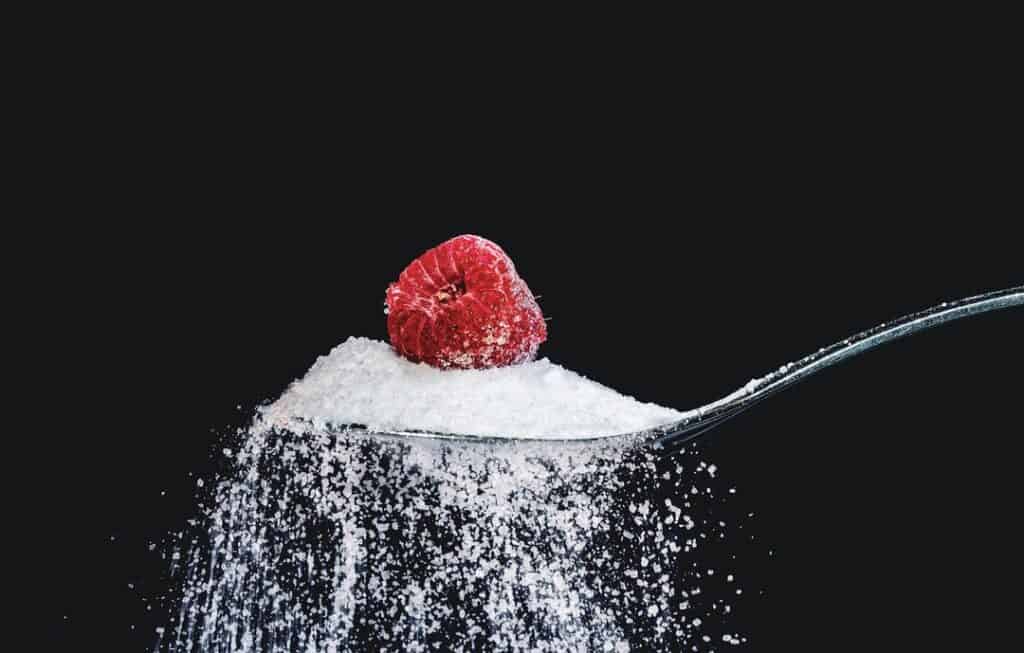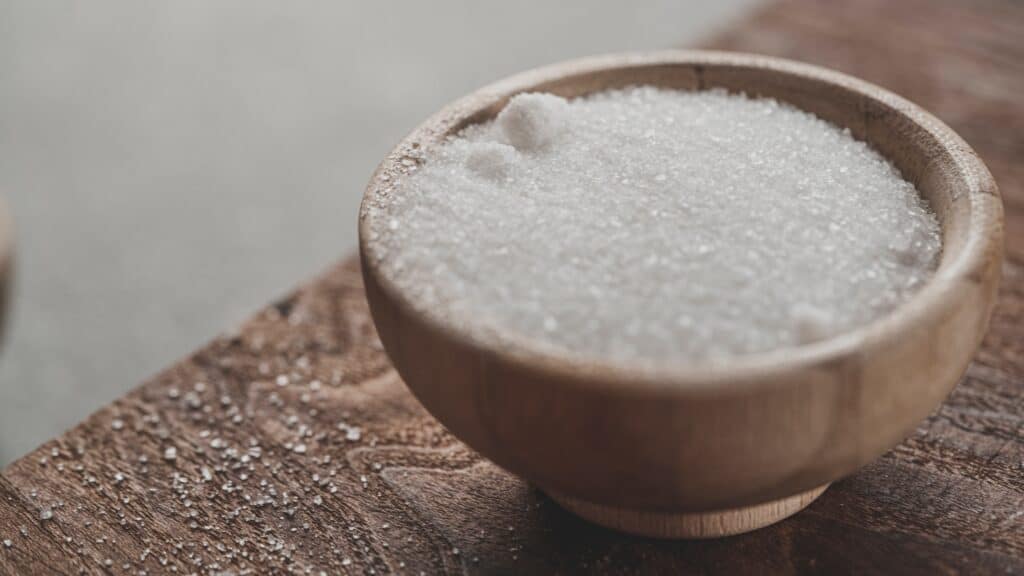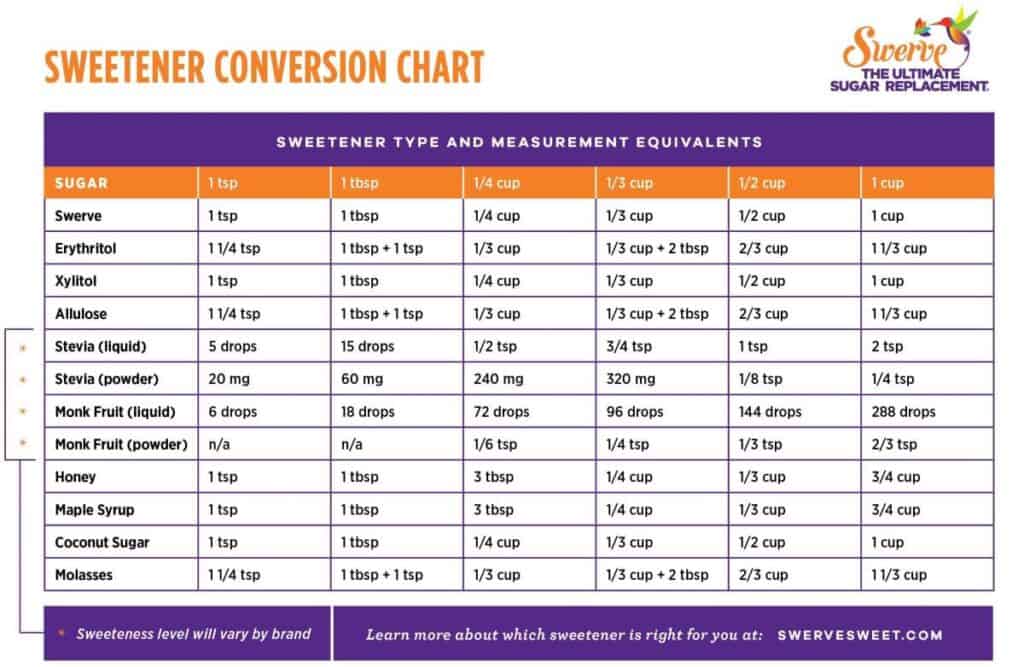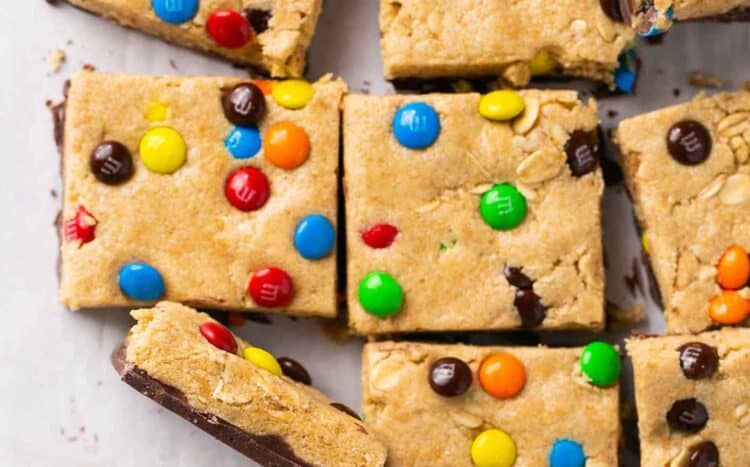This post may contain affiliate links. Please read my disclosure policy.

It’s no secret that there is always a lot of hype around artificial sweeteners, natural sweeteners or any type of sugar substitute. Some will say they’re terrible for you, while others will argue that anything in moderation is fine. Because it’s one of the my most frequently asked questions, I thought I’d break down my thoughts for you!
If you’ve ever made one of my dessert recipes, there’s a good chance the recipe called for Swerve, Truvia, monk fruit, stevia or some sort of sugar substitute. But why sugar substitute instead of sugar? What is Swerve?
Swerve is a natural sweetener, just like sugar. Unlike artificial sweeteners, such as aspartame, saccharin and sucralose, Swerve Sweetener is made only from natural ingredients and contains no artificial ingredients, preservatives or flavors (6). The secret to the zero calorie sweetness is a combination of erythritol and oligosaccharides which provide excellent baking and cooking functionality. And with the ability to brown and caramelize, Swerve makes a great all around substitute for sugar.

Three Types of Sugar Substitutes
To start, I thought it would be helpful to break down the three types of sugar substitutes first.
1. Artificial Sweeteners
Artificial sweeteners are a synthetic sugar substitute. Many are derived from natural substances and are much sweeter than sugar itself. Artificial sweeteners add virtually zero calories to the recipes they are included in.
Examples of artificial sweeteners include aspartame (Equal), saccharine, and sucralose (Splenda).
2. Sugar Alcohols
Sugar alcohols are carbohydrates that occur naturally in certain fruits and vegetables – although they can also be manufactured. Don’t be fooled – despite the name, sugar alcohols are not alcoholic. Sugar alcohols are not typically as sweet as sugar and aren’t as intense as artificial sweeteners. Sugar alcohols do contain calories, but they are much lower than sugar. If you’re curious how to track sugar alcohols, we will break that down below.
Examples of sugar alcohols include erythritol (Truvia), Swerve, and Allulose.
3. Natural Sweeteners
Natural sweeteners are often promoted as the “safer” or “healthier” sugar substitute. However, even these alternatives typically go through some type of processing and refining.
Examples of natural sweeteners include stevia, monk fruit, honey, molasses, maple syrup or fruit juices/nectars.
But Aren’t Sugar Substitutes Bad for You?
Sugar substitutes haven’t always gotten the best rap. For years they’ve been criticized and have even been linked to cancer. However, according to the National Cancer Institute and other health agencies, there’s no scientific evidence backing up those claims.
A lot of people also criticize sugar substitutes saying that they lead to digestive issues. Fortunately, digestive issues are only likely to occur when sugar substitutes are consumed in large amounts (1,4). This is why moderation is key! Also, everyone’s tolerance will vary person to person, just like with any other food/allergen. I can personally say I have not experienced any issues and that is why I continue to use them in my recipes!
But let’s not just focus on the bad. There are actually quite a few benefits linked to zero-calorie sugar substitutes.
Benefits of Zero-calorie Sugar Substitutes
Less Calories Than Sugar
Because sugar substitutes contribute essentially zero calories to a recipe, you can make and enjoy sweets and desserts for much fewer calories than with baking with traditional sugar. Of course there is nothing wrong with sugar and I am by no means saying that. But if I can have three cookies for the same calories as one cookie, it still tastes hella good AND I enjoy it, then why the heck would I not do that?
Diabetes, PCOS, Insulin Resistance
We all know how sugars impact glucose levels. But since sugar substitutes aren’t carbohydrates, they generally don’t raise blood sugar levels. This can be life changing for anyone who has diabetes, PCOS or any other condition where they need to keep blood sugar levels at bay. Because these sweeteners allow them to enjoy their favorite sweetened things! With less risk to their health. Of course, always consult your doctor or healthcare provider for guidance on sugar substitutes and their recommendations.
Health Benefits
Sugar has zero health benefits. It’s sole purpose is to be added to food and drinks to make it taste more yummy. Basically, its empty calories because it “contains virtually no vitamins, minerals, protein, fat, fiber, or other beneficial compounds.” (2) On the flip side, natural sugars can be more than just something that sweetens your drink and food. In fact, many natural sweeteners have been found to be very beneficial to your health, for a number of reasons. Note that each sugar substitute will have different benefits depending on the source it was derived from.
Don’t Have to Use As Much
Sugar substitutes are also typically sweeter than traditional sugar (1). When using or baking with sugar substitutes, you typically only need a fraction of the amount of sugar called for. This of course depends on the type of sweetener you are using. For more information on how to convert the amount of sugar for sweetener, check out the chart below!
FDA Approved
Sugar substitutes are approved by the FDA. This means the FDA has declared that sugar substitutes are safe to consume in reasonable amounts. If you are curious about the recommended daily amounts, I encourage you to check out the FDA website found here.
So why do I use zero-calorie sugar substitutes instead of sugar in my dessert recipes?
Pretty much for all the reasons above!
- Less calories, less carbohydrates – using sugar substitutes bring down the calories and carbohydrates a ton. This is huge for me because I am not that girl who can eat a few pieces of chocolate and be satisfied. No, I want two brownies and with some ice cream to top it off please! Using sugar sweeteners allows me to enjoy the foods I love without eating half of my daily calories in one dessert, and in turn has been hugely beneficially in helping me maintain my weight. I am grateful for them for that!
- No blood sugar crash – whether you have diabetes, PCOS or any type of insulin resistance or not, if you don’t get a blood sugar spike, then you don’t get a blood sugar crash! No one likes blood sugar crashes. They make you feel tired, gross, and meh. Desserts sweetened with these types of substitutes don’t do that!
- Health benefits – as mentioned, different sugar substitutes have different health benefits, which is why I like switching them up and not necessarily always sticking to one. Regardless of the one I use, I know it’s always going to be a better than sugar since sugar is empty calories anyway.
What if I want to use sugar instead?
Then use sugar! You can absolutely use sugar in place of any of my recipes that use natural sweeteners. Just know that you may need to add a little more since different types of sweeteners can have varying levels of sweetness. See the chart below for more on this.
How and When to Track Sugar Substitutes
You might have also noticed that I do not, nor have I ever, included artificial sweeteners in the macros when calculating the nutrition facts for a recipe. Why you might ask? Let me explain!
Erythritol is a type of polyol, also referred to as a sugar alcohol, that contains zero calories per gram. On the nutrition label, the carbs listed represent the sugar alcohol (erythritol) in the sugar substitute. This is the case for Truvia, Swerve, and monk fruit sweetener too since monk fruit extract is often blended with erythritol to make it look and taste more like table sugar.
Sugar alcohols are not completely absorbed by the body during digestion, which means the body does not get as many calories or carbohydrates from these. Erythritol has the lowest calorie content of any sugar alcohol at 0–0.2 calories per gram. This means that the amount actually processed by the body is very minimal, and in my opinion just not worth the calculation or mental headache.
For example, if we take the high end of what research says is actually absorbed (0.2 calories per gram) and we had a recipe that had 1/4 cup (48g) of sweetener, that would mean that the sugar substitute only added 9.6 calories to the ENTIRE recipe (not just per serving). If you are very diligently tracking for a specific goal like bodybuilding, it may be worth the extra step to include those calories into your overall recipe. But honestly I don’t even think it’s worth the mental headache for that. And for the majority of us, it really will not make a slick of difference in the grand scheme of things.
You Decide
I hope this information was helpful in clearing up some of the confusion surrounding artificial sweeteners and sugar substitutes. As mentioned before, I personally have not experienced any negative side effects from using natural sweeteners in my recipes. I think it’s just so important to remember that we are all different and as with anything else, moderation is key. Be sure to check out all the yummy lightened up desserts on blog if you haven’t already!
Sweetener conversion for different sweeteners!
Directly from the Swerve website, a closer look at how sweetness can vary depending on the type of sweetener (7).

References
(1) https://www.ncbi.nlm.nih.gov/pmc/articles/PMC7504156/
(2) https://www.healthline.com/nutrition/refined-sugar
(3) https://www.healthline.com/nutrition/healthy-natural-sweeteners
(6) https://www.healthline.com/nutrition/swerve-sweetener
(7) https://swervesweet.com/blog/sweetener-conversion-chart
(8) https://www.ecfr.gov/current/title-21/chapter-I/subchapter-B/part-101#p-101.9(c)(1)(i)(F)
